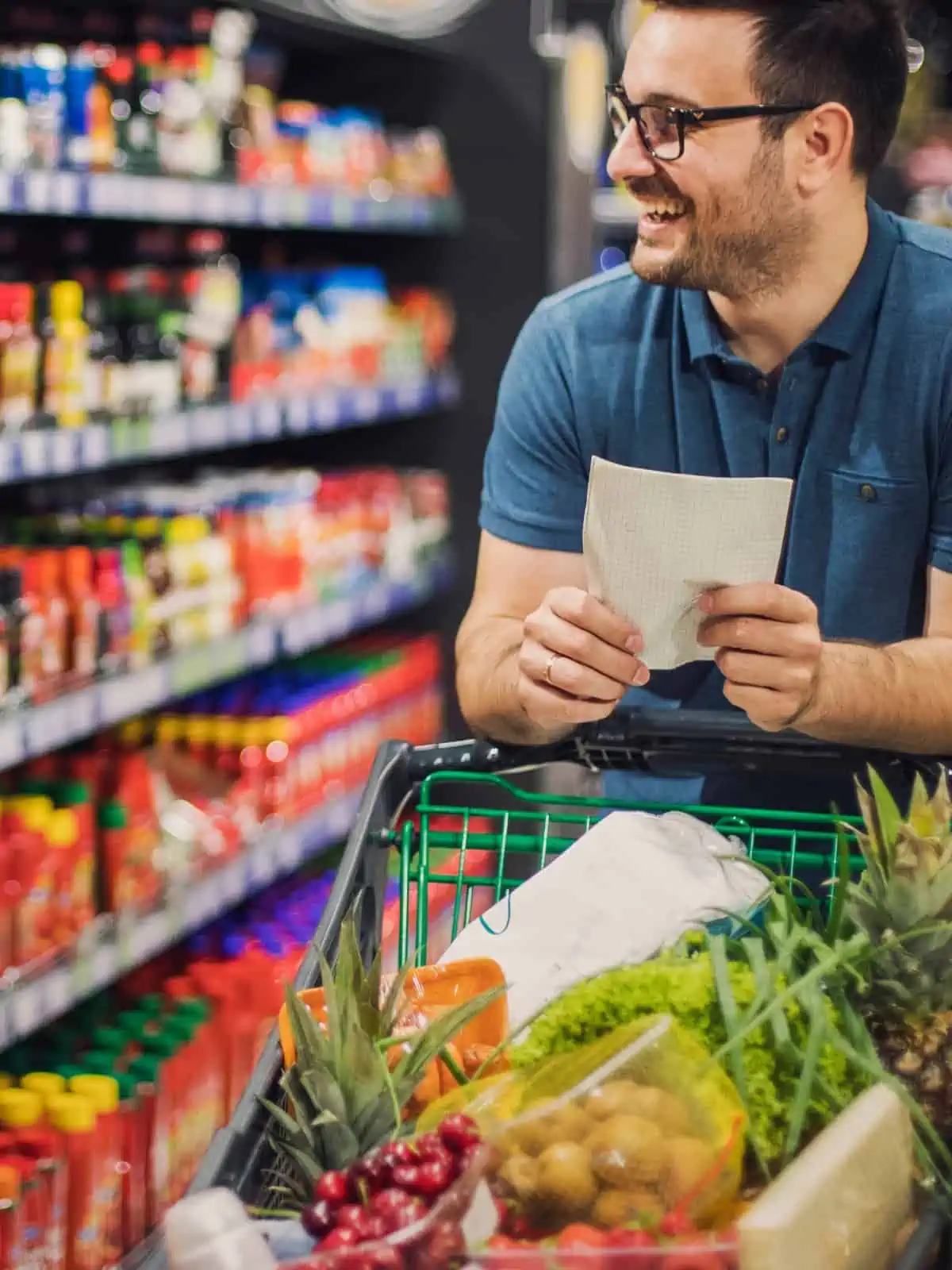* We sometimes use affiliate links, so we may receive a commission, at no cost to you, if you make a purchase through a link. Check our disclosure for more info.

I'm Steph, mum of three! 👋
Here, I share practical insights on making (and saving!) money. With a knack for budgeting and a passion for financial freedom, I've picked up lots of tips & tricks along the way. And I can't wait to share them with you here!
Tired of over spending in the supermarket? Us too. Check out our grocery shopping tips on a budget, because with prices soaring and income not keeping up, there’s lots you can do to make your money stretch!

Grocery Shopping Tips On A Budget In The UK
In today’s busy world managing your money and making every penny count has become increasingly important. One area where you can make a big old impact on your bank balance is your supermarket shopping.
By implementing some clever strategies and being mindful of your spending you can save a substantial amount of cash without compromising on the quality of your meals.
Getting a grip of the of budget-friendly grocery store shopping is the first step toward achieving financial stability and ensuring that your hard-earned money goes further. With rising food costs and a seemingly endless array of tempting products vying for your attention, it’ll pay to make sure you’re aware of all the tips and tricks to bring your bill down.

Whether you’re a student on a tight budget, a frugal family seeking ways to stretch your income or simply looking to save money, the grocery shopping tips outlined in this article will be helpful if you’re trying to save cash.
Let’s dive in and explore the world of grocery shopping on a budget, where frugality meets deliciousness and where every penny saved brings you closer to more money in your hands!
More Ways To Save Money
- Sky deals for existing customers
- Online shopping tips to save money
- How to save money on GOOD dog food
- Where to buy factory seconds
- 15 Ways to make your money go further

Planning Your Grocery Shop Ahead Of Time
Planning your shopping list ahead of time is the single biggest ‘thing’ you can do to get a grip of your supermarket shopping budget.
We’ve all been there, wandering mindlessly through the aisles, looking at the offers being taken in by advertising and a big, colourful ‘discount’ sign. Then you get home and bam! there’s nothing for dinner come day two. Yes, it’s a familiar scene in many of our homes, but it doesn’t have to be this way.
There’s a better way, and not only will your food shop last all week, but it’ll cost you less too!

Create a grocery budget
Instead of saying we’ll spend £70 a week on the food shop, try working out what you can realistically afford and then work out your meal plan and food shop around that. Let’s say it’s £50 you can comfortably afford (i know, that’s likely low these days!), then work out your food shop within your budget.
For most of us, the grocery shop is, besides the mortgage or rent, the biggest outgoing we have. Try and make it affordable. If your pushing your budget every week and it’s more than you can really afford, then bring it down. You can always adjust it later.
Make a meal plan for the week
Meal plans are the best. Yes, they can be a pain to get into, they’re a bit of a hassle to create at first but once you get into it and start to save them and reuse them, mix them up and switch them up, I promise you you’ll start to love them.
All you need is a piece of paper and a pen if you’re old school like me, use your phone if your more tech-y than me (!) but the point is, it doesn’t have to be hard. This is a great basic meal plan to get you started.
Be realistic. Breakfast, lunch, packed lunches, dinners, snacks etc..all need to be figured in. If you try and skimp on this, you’ll end up back in the shop spending yet more money. Trust me, I’ve been there!

Check your cupboards and create a shopping list
For your first week, check your cupboards and freezer before you make your first meal plan. Use what you have to start with, it’s easier to get going this way and you’ll free up some freezer room for upcoming leftovers and second meals.
Stick to the grocery list
When you’re in the shops, stick to the list when you’re food budgeting. Discounted products, offers, 3 for 2’s and anything else you see will be distracting. If somethings’s not on your list, don’t buy it.
The exception to this dry foods. If you have rice, or pasta for example on your list and it’s half price, buy two. It won’t have cost you anymore and you can incorporate it into your meal plan in the next couple of weeks. But this applies only if you’re not buying premium price food. And to be honest, it’s usually the higher price foods that go on offer. Be alert!
Clever Grocery Shopping
Clever grocery shopping is when your food shop works better for you than it does for the shop. Shops want you to spend as much as you possibly can to maximise their profits: this only works for them, not for you.
Turn this round and stop playing into their tricks. The aim here is to feed your family well, on a budget. It’s very possible!
Compare prices and look for sales
This is where it can get a little time consuming. But if you’re serious about saving cash, it’s worth spending a couple of hours getting to know which supermarkets really are lower. And they’re not always the ones you think.
MySuperMarketCompare gives you a place to have a look and see the price difference of the branded products you like to buy. It’s eye opening. If you can, you may have to go to a couple of different supermarkets to get the best deals. If you’re spending enough to get free delivery then do that instead, but with a little time and effort you can still get all your favourites at the lowest prices.
Utilise coupons and discounts
Make sure you sign up for a Tesco clubcard and Sainsbury’s Nectar card and any others on offer and use coupons. They give you not only rewards but they’ll give you vouchers and money off coupons to use when you’re shopping.
Sometimes these will be helpful: if they offer you money or a good deal off products you’ve previously bought, and sometimes they wont and will offer you premium products they’re promoting (ignore these!). You’re not wasting money letting these coupons expire, you’re saving money not buying the products they’re trying to promote!
Shop at discount stores or wholesale clubs
If you have a cash and carry, or Bookers shop near you and you have a card, think about buying the things you use most often in bulk, if you have the room to store them and you know you’ll use them. For us, this is frozen and dry foods like grains, oats, canned tuna, spices and herbs, honey, peanut butter, flour, toilet roll and condiments. And again, we can’t stress this enough, make sure the prices really are cheaper.
Consider generic or store brand products
Store own brands are almost always cheaper than the branded equivalents. Very often it’s the same product made in the same factory, simply without the familiar branding we all recognise.
If you’re unsure about a generic product, check the label against the branded one. I’ve found that often the branded ones have more added flavourings etc… to enhance the flavor of a product (which is not great anyway) and we get so used to a taste that anything else seems ‘off’. Try the branded items for a few weeks, more often that not the kids get used to new flavors just like they did the branded ones.
And for us, it was a case of i you don’t like it, don’t eat it :)
Avoid Waste
Food waste come sin at roughly 9.5 million tonnes in the UK (source). This is eye watering when so many people don’t have enough money to eat 3 meals a day, or even every day at all. It’s pretty shocking. And a lot of this comes down to bad planning or no planning at all.
Use the tips below to minimise your waste:
Plan meals to use ingredients efficiently
Again, meal plan, meal plan, meal plan!! If you know what you’ve got in your cupboard and fridge/freezer you can incorporate this into your shop.
Planning meals to use ingredients efficiently is a key way to maximise your grocery budget and reduce your food waste. By taking the time to plan your meals in advance, you can ensure that you utilise the ingredients you have on hand and avoid buying items you don’t really need.
Start by looking at what what you already have in your cupboards, fridge and freezer. Take note of any perishable items that need to be used soon. Incorporate these ingredients into your meal plan to prevent them from going to waste.
When creating your meal plan try and aim for variety. Choose recipes that allow you to use common ingredients in different ways or can be easily adapted based on what you have available. For example, a simple roasted chicken can be transformed into sandwiches and salads or added to stir-fries throughout the week.
Consider batch cooking or meal prepping to make the most of your ingredients. Cook larger portions and freeze individual portions for future meals. This not only saves you money but also saves time on busy days when you don’t have the energy to cook from scratch. Double bonus :)
Lastly, be aware of portion sizes. Prepare only what you and your family will consume to minimise leftovers. However, if you do have leftovers then get creative with repurposing them into new dishes or using them in the next days meals.
By planning meals to use ingredients efficiently, you can stretch your grocery budget further, reduce food waste, and enjoy a variety of delicious meals. It’s an all win situation for your wallet!
Repurpose leftovers into tomorrows lunch
When you plan your meals in advance it’s super easy to make enough for lunch the next day. If you’re cooking anyway, make enough so that you can wrap some up for lunchboxes or to reheat at work.
If you’re taking lunch into work and have a microwave, you can pretty much take in anything you had the night before, and for the kids, quiche, pasta salads etc…can be boxed up and taken to school. Try and get out of the habit of making the same old lunchboxes you always have, the variety is better for the kids and better for your wallet!
Freeze excess produce or meals for later use
The best thing I did when we started doing this was making double batches of dinners and freezing them. Somehow, making a double batch of something doesn’t always have to mean double the ingredient’s. You can bulk out a stew with beans etc… and you’ll then have a meal to take out of the freezer in the morning and pop straight into the oven when you get home that evening.
Once you start doing this you’ll see how easy it is, not only is there a meal that’s home cooked and cost next to nothing to make but you’ll be feeding your kids a great dinner. There really are no downsides to this!
Stay Focused While Shopping
Focus! Food shopping when you’re distracted means you’ll end up with more in your trolley than you bargained for. Give your self a time limit, focus on your list and try very, very hard to ignore what’s going on around you. I know, this feels like it’ll take a miracle sometimes, but it’s worth it, I promise!
Avoid shopping when hungry or rushed
Stick to a time frame, but don’t be rushed. If you’re rushing, you won’t have time to compare prices and labels etc…and you need to make this a habit. Likewise, if you go food shopping when you’re hungry then everything’s going to seem appealing and you’ll likely to buy things you otherwise wouldn’t.
I also try not to go shopping with the kids. They can be almost as persuasive and the tricks the shops themselves use to lure you into buying something and there’s been more than one occasion I’ve ended up buying something just to avoid what looked like an impending melt down (the child, not me :) and so now, if I possibly can, I food shop without kids.
Stick to your shopping list and resist temptations
If it’s not on the list, don’t buy it. It’s that simple. And yet…..it’s just not, is it! It took quite a long time to get into this habit and actually buy only what’s on the list! I started to add up everything I was buying that wasn’t on my list and that was enough to stop me doing it.
We’re trying, we’re not perfect. Don’t beat yourself up over this, you’ll get the hang of it sooner or later, and the cash savings were a big enough incentive for me.
Be mindful of marketing tactics and product placement
The marketing tactics food shops use are effective. They’re REALLY effective, even when you know what they are.
It’s well known that supermarkets invest significant resources in marketing and promotional activities to attract customers and drive sales and profits. These marketing tactics include product placement, eye-catching displays, signage, special offers, loyalty programs and likely, loads more. Some will benefit you like the loyalty programmes, others (most of them!) only benefit the stores themselves.
Supermarkets often employ techniques aimed at influencing consumer behaviour such as strategically placing high-profit-margin items at eye level, using colourful packaging and signage to grab attention or offering enticing discounts on certain products, most often the premium priced ones.
Large supermarket chains in the UK typically have dedicated marketing teams and substantial marketing budgets to develop and execute these tactics. They know the things that play on our emotions and our habits. It’s a tough call to ignore these, but ignore these you must if you want to save cash!
Conclusion
In conclusion, adopting clever food shopping strategies is a powerful tool for saving money and optimising your budget.
One of the fundamental pillars of budget-friendly food shopping is proper planning. By creating a meal plan, taking inventory of your cupboards and incorporating existing ingredients into your meals, you can minimise waste and avoid unnecessary or impulse buys.
Staying focused while food shopping is another crucial aspect of budget-conscious grocery shopping. By planning your shopping trips, sticking to a list, and being mindful of marketing tactics, you can avoid impulse purchases and make more intentional choices. Shopping with a full stomach, setting time limits and utilising shopping apps can help you stay on track and prevent unnecessary spending.
Moreover, taking advantage of cost-saving opportunities can significantly impact your grocery budget. From comparing prices, using coupons and discounts, to exploring loyalty programs and bulk buying options, there are numerous ways to maximise your savings. By being proactive and staying informed about available deals and promotions, you can make the most of your shopping experience.
Incorporating these grocery shopping tips on a budget into your routine requires commitment, planning, and a shift in mindset. However, the rewards are well worth the effort. By implementing these strategies, you gain control over your spending, reduce waste, and have the opportunity to make healthier and more mindful food choices.
Remember, budget-friendly grocery shopping is a journey, and it may take some time to fine-tune your approach and find the strategies that work best for you. Be patient with yourself and celebrate the small victories along the way. Each step you take toward more intentional and budget-conscious grocery shopping brings you closer to financial freedom and a healthier, more sustainable lifestyle.
So, whether you’re a student, a busy professional, or a family seeking ways to stretch your income, these grocery shopping tips on a budget are valuable resources to help you achieve your financial goals.
By embracing these strategies, you can transform your grocery shopping experience from a source of financial stress to an opportunity for savings, creativity, and mindful consumption.
Start implementing these tips today and enjoy the benefits of a well-managed grocery budget and a healthier relationship with your food and finances.
